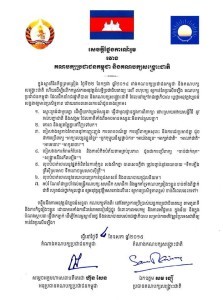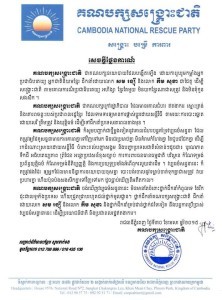However, the two poles have come up with this new trend to maximize interests for Cambodian people but it doesn’t translate that each party has no hidden agenda to gain their own advantages.
For the CNRP, their advantages are to instill new paradigm of political pragmatism of democracy and sustainable development, but for the CPP is possibly to gear up split between the soft-liners and hard-liners among those CNRP’s supporters. The overwhelming supporters of the CNRP or those of more than half of the Cambodian population is a tasteful piece of cake but right now someone is trying to cut this one piece into several pieces or at least two pieces before the swallow into their throat.
On the other hand, Sam Rainsy has been regarded as the hero of the nation as he has always stood up to protest the hegemony and borderline trespassing of Vietnamese over Cambodia territory land, so his new approach to Culture of Dialogue has likely encouraged CPP’s politburo to do something to reduce his heroism and nationalism at the moment.
Lately, the development of “culture of dialogue” of the Cambodian National Rescue Party (CNRP) and the Cambodian People’s Party (CPP) has outreached to seven points of detente. Previously, each party issued guidance letter to their activists and grassroots levels. But this detente code of conduct for the two parties “Culture of Dialogue” might not be the last, or the beginning.
The Culture of Dialogue
 As previously written, “Culture of Dialogue” is not new in the context of daily use for common communication. Humankind has communicated with each other at least since the birth of human social establishment. But when this term has developed and evolved itself into more professional level, the Culture of Dialogue ideally means a norm or guidance of a shared exploration towards greater understanding, connection and possibility.
As previously written, “Culture of Dialogue” is not new in the context of daily use for common communication. Humankind has communicated with each other at least since the birth of human social establishment. But when this term has developed and evolved itself into more professional level, the Culture of Dialogue ideally means a norm or guidance of a shared exploration towards greater understanding, connection and possibility.
The dialogue consists of formal and informal. The following is considered formal dialogue of democracy:
- public talk about social issues
- in communities (in homes, temples, cafes, schools),
- in the media (through journalism and some art, entertainment and advertising) and
- in academia (where experts generate knowledge and debate ideas via researches)
- governmental deliberations about social issues
- in legislatures
- in executive bureaucracies and
- in the judicial system
- Proxy discussion about social issues is the extent of political myth to develop democracy.
- in art and fiction (including novels, TV, movies, drama, etc.)
- in expressive forums (talk shows, letters to the editor, broadcast town meetings) in which ordinary people speak their minds on public issues and
- in facilitated dialogue among “representatives” of stakeholders or the general public, such as the citizen consensus councils used in Denmark, Canada and elsewhere.
- Political Debate is popularly practiced in democratic countries such as the United States, UK, Canada and elsewhere. In Canada, the debates among key political party leaders are included in federal, provincial and municipal (see this link as example of provincial election or local government for this 2015). In the UK, this 2015 national election has run through hot debate among those key political party leaders (see this link as for your example).
The Culture of MAD Politics
 MAD is derived from “Mutually assured destruction, or mutual assured destruction” which has been likely extensively used by the military policy during the cold war and post-cold war. It has been theorized that a full-scale use of high-yielded weapons of mass destruction by two or more opposing rivals that would cause complete annihilation of both ie. the attacker and the defender, for instance, see pre-emptive nuclear strike and second strike.
MAD is derived from “Mutually assured destruction, or mutual assured destruction” which has been likely extensively used by the military policy during the cold war and post-cold war. It has been theorized that a full-scale use of high-yielded weapons of mass destruction by two or more opposing rivals that would cause complete annihilation of both ie. the attacker and the defender, for instance, see pre-emptive nuclear strike and second strike.
In Cambodian context, this is in high alert of Lon Nol republican politics, Khmer Rouge revolutionary regime, and Vietnam socialist occupation over Cambodia.
The Seven Codes of Conduct for their Detente
According to the letter issuance signed by Hun Sen and Sam Rainsy, the seven codes are following:
- Be honest and sincere.
- Respect and value each other.
- Avoid at all costs provocations; refrain from insults like “communist dictators,” “Vietnamese puppets,” and “traitor”.
- Avoid threats and intimidations in any forms such as “detainment” or “war will start.”
- Eradicate concepts of revenge and holding grudges.
- Eliminate racism and extremist politics.
- Persuade officials, members, and supporters of each party, from the local to the national level to adhere to the above-mentioned points.
This Friday of May 10, 2015 statement is agreed to end using abusive threats and degrading insults against one another.
What shall be done and be undone?
Cambodian politicians have led bad examples of MAD politics against one another during these past decades. At least we can say before the July 2014, Cambodian politicians led bad examples by exposing full scale of black and white politics such as when I exist, you must be disappeared; in return, another contender are going to devise the same strategy. Many terms politicians have used and inherited towards Cambodian people and younger generations such as traitor (មេក្បត់ជាតិ), Vietnamese puppet (អាយ៉ងយួន), Vietnamese head but Khmer body (ក្បាលយួនខ្លួនខ្មែរ), threat and intimidation, and many other slandering words.
Of course, those words were tremendously created during the Vietnamese war. Counting from Lon Nol republican, to Pol Pot revolutionism, and Hun Sen-Vietnamese socialism, many derogatory and slandering words are used and become norms and political culture in Cambodia politics.
Embracing new pragmatism on culture of dialogue to eradicate those white and black, or MAD politics, is a challenge for the leaders.
However, the two poles have come up with this new trend to maximize interests for Cambodian people but it doesn’t translate that each party has no hidden agenda to gain their own advantages.
For the CNRP, their advantages are to instill new paradigm of political pragmatism of democracy and sustainable development, but for the CPP is possibly to gear up split between the soft-liners and hard-liners among those CNRP’s supporters. The overwhelming supporters of the CNRP or those of more than half of the Cambodian population is a tasteful piece of cake but right now someone is trying to cut this one piece into several pieces or at least two pieces before the swallow into their throat.
On the other hand, Sam Rainsy has been regarded as the hero of the nation as he has always stood up to protest the hegemony and borderline trespassing of Vietnamese over Cambodia territory land, so his new approach to Culture of Dialogue has likely encouraged CPP’s politburo to do something to reduce his heroism and nationalism at the moment.

Hence, Vietnam’s policy to dominate Cambodia and Lao is just their exit way from China’s hegemony. In some situation, China can oversea all Vietnamese desires to counter-strike its hegemony, but China could not see the Vietnamese waves flowing under the water surface – the infiltration of Vietnamese populations through intermarriage, accustomization and acculturalization such as changing the last name and first name, dressing the local traditional etiquette, and speaking the Khmer and Laotian language etc.
http://www.sophanseng.info/2014/12/cambodia-in-between-china-and-america/